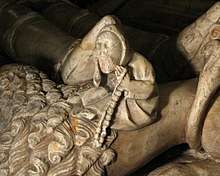Beadsman
Bedesman, or beadsman (Med. Eng. bede, prayer, from O. Eng. biddan, to pray; literally "a man of prayer"; and from Anglo Saxon "bed"), was generally a pensioner or almsman whose duty it was to pray for his benefactor.

Function
A Bedesman (or Bedeswoman) in Medieval times worked in this Christian occupation attached to the crown and churches in Scotland and England. In general the task was to pray for souls listed on a bede-roll (pictured) represented by small items on a string called "bedes" (i.e. "prayers"). Souls who wished to be prayed for, secured their listing by giving alms, donations, or gifts.[2] Or, if a departed member of a guild, the Chaplain would add them to the roll for prayer post-mortem. When, in the twelfth and thirteenth centuries, the use of little perforated globes of bone, wood, or amber, threaded on a string, came into fashion for the purpose of counting the repetitions of the Our Father or Hail Mary, these objects themselves became known as bedes, later becoming known as "beads".[2]
Bedehouse
Bedesmen were sometimes accommodated in a Bedehouse (an alms-house), some of which have survived into modern times. These are generally considered to be buildings of special interest and are often listed.
Royal arrangement
In Scotland there were public almsmen supported by the king and expected in return to pray for his welfare and that of the state. These men wore long blue gowns with a pewter badge on the right arm, and were nicknamed Blue Gowns. Their number corresponded to the king's years, an extra one being added each royal birthday. They were privileged to ask alms throughout Scotland.[3] On the king's birthday each bedesman received a new blue gown, a loaf, a bottle of ale, and a leathern purse containing a penny for every year of the king's life. On the pewter badge which they wore were their name and the words "pass and repass," which authorized them to ask alms.[4] The last beadsman died in Aberdeen in 1988.
England
In consequence of its use in this general sense of pensioner, "bedesman" was long used in English as equivalent to "servant." The word had a special sense as the name for those almsmen attached to cathedrals and other churches, whose duty it was to pray for the souls of deceased benefactors. A relic of pre-Reformation times, these old men still figure in the accounts of English cathedrals.[5][4]
Elsewhere
In a somewhat similar practice, in Spain (roughly 14th century onwards), there were blind people hired to sing prayers for customers. Some customers were regulars, others hired these singers only from time to time.[6]
References
- Camm, Bede (2004), Forgotten Shrines, Gracewing, p. 16, ISBN 0-85244-615-2, retrieved 24 November 2010.
- Bede
- Chambers, Robert (1885). Domestic Annals of Scotland. Edinburgh : Chambers. pp. 183–84.
-

- Gold – a new rush?
- Gomis, Juan. "Pious voices: Blind Spanish prayer singers." Renaissance Studies 33.1 (2019): 42-63.